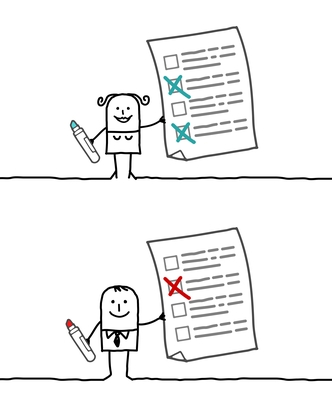Now that the BIG elections are over, can we tell you how much we loathe-despise-detest pollsters?
We’ve learned how to zero out (to avoid the robo-dialers). Found excuse after excuse to disqualify ourselves from responding to a live questioner. [Try “I gave at the office.” It’ll flummox them every time.] Squirmed and gave weird comments to the “other” answer in online surveys.
Yet, somehow, THEY know: There’s a fellow feeling deep down of compliance, of understanding that it takes 10,000 calls to create a village of 1,000. Besides, we do the same thing … inside.
So why the avoidance, the need to be, quite simply, contrary?
It might be because we’re over-surveyed. Have lost faith in the power and performance of polls. Witnessed the conflict among numbers in national reports. Or prefer, honestly, to engage in conversations with those around us, testing what we need to among the groups who know and work with us. A focus group of friends, if you will.
Is it statistically significant? Nope.
Can we ferret out real intentions in these dialogues? Maybe yes. Maybe no.
 When we do want to get a snapshot in the moment of what people know, what they believe, and the actions they follow, this is our preferred route. It’s like copytesting, probing opinions and communicating both ways. Asking strangers, even inside corporations, about certain matters is like asking for a leap of faith; many – even if you’ve been referred by the senior-most executives – will either decline politely or go through the answers somewhat mechanically. Sure, the humongous engagement surveys do get responses. Sure, they’re anonymous, without attribution. Yet, there’s no opportunity to exchange ideas and thoughts; that “other” bucket receives the venting from many … but it doesn’t answer back.
When we do want to get a snapshot in the moment of what people know, what they believe, and the actions they follow, this is our preferred route. It’s like copytesting, probing opinions and communicating both ways. Asking strangers, even inside corporations, about certain matters is like asking for a leap of faith; many – even if you’ve been referred by the senior-most executives – will either decline politely or go through the answers somewhat mechanically. Sure, the humongous engagement surveys do get responses. Sure, they’re anonymous, without attribution. Yet, there’s no opportunity to exchange ideas and thoughts; that “other” bucket receives the venting from many … but it doesn’t answer back.
So when you ask us to sample our opinions, think again, please, about the “how.” We’re counting on it.
